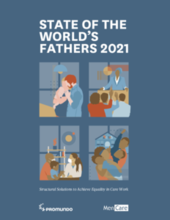Displaying 101 - 110 of 947
The New Neighborhood is a limited series podcast that explores some of the dramatic changes taking place across the U.S. as people work to reinforce a sense of community, support young children and families, and work to build equity within communities.
The State of the World’s Fathers 2021 report – the fourth in the series – presents research on care work during the COVID-19 pandemic, focusing on structural barriers that prevent equitable distribution of caregiving between women and men.
This course is a resource for parents or those who work with parents of young children to support them to provide brain-building experiences and nurturing care.
The objective of this study was twofold: to explicate how a culturally adapted parent training (PT) intervention for diverse families involved in child welfare services (CSW) was perceived by participants and to better understand how interventionists adapted to families’ needs.
This contribution is a collective re-analysis of three research projects in Iceland focused on parenting with a disability which draws upon data spanning a twenty-year period. The core purpose of these projects is to understand why parents with primarily intellectual disabilities encounter such difficulties with the child protection system.
This booklet was produced by the United Nations Office on Drugs and Crime in collaboration with The University of Manchester and aims to help parents and their children as they navigate challenges and stay connected as a family.
This article reports on the use of a suite of validated instruments to measure the impact of services on children and their parents in receipt of services provided by an Irish Non-Governmental Organisation (NGO) across their seven family centres.
This study examines the effect of an innovative caregiver education program in China on caregivers' perceived increase of parenting knowledge.
This paper reports on the results of an online survey of P2P stakeholders regarding: How text‐based support is being used in P2P programs and whether text‐based support is perceived as providing benefits to parents of children with disabilities.
This report sets out the findings from the most comprehensive study of attitudes towards bringing up children from conception to 5 years ever undertaken in the United Kingdom.




